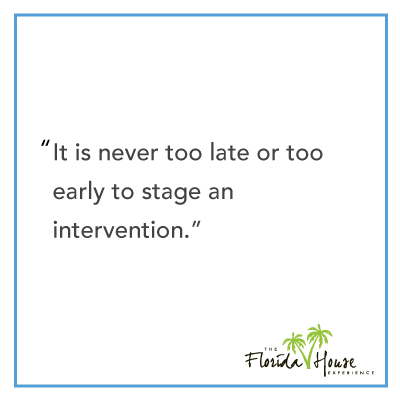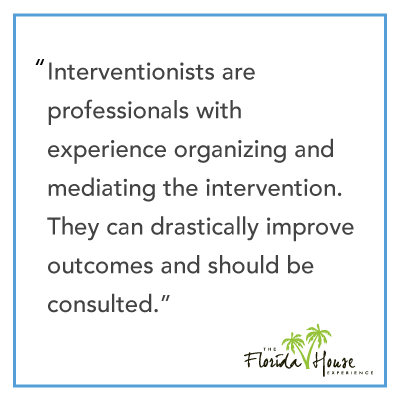
Seeing someone you love struggle with addiction is challenging. You want to help them but also not force your opinions on them and possibly fracture the relationship. Figuring out how to do this is complicated but entirely possible and highly effective. Intervention help is a good method to make addicts aware of their illness and the necessity for change.
Interventions can be staged in several different settings including school, home, places of worship, and the jobsite. No matter where they take place, interventions leave addicts with more knowledge, beliefs, improved attitudes, and social support. They can be highly emotional experiences but are worth it.
What is an Intervention?
An intervention is a process intended to help a loved one, family member, friend, or colleague recognize their potentially harmful habits, behaviors, thoughts, and feelings in hopes that this awareness will inspire them to change. The intervention is never to be approached in a threatening way, as that often causes an addict to become closed off and not listen to your appeal. Interventions are designed to make the person see the impact of their drug and alcohol use on themselves and those around them.
 Usually in an intervention, multiple people are involved who can ready themselves to speak respectfully and clearly with the individual who needs treatment. Those holding the intervention should prepare what they will say and do beforehand to keep the subject calm. They have to share facts and information about the behaviors they find troubling, making sure to delineate how those habits are having a personal impact on them and their lives.
Usually in an intervention, multiple people are involved who can ready themselves to speak respectfully and clearly with the individual who needs treatment. Those holding the intervention should prepare what they will say and do beforehand to keep the subject calm. They have to share facts and information about the behaviors they find troubling, making sure to delineate how those habits are having a personal impact on them and their lives.
Regardless of how intervention help is ultimately conducted, the sole objective remains to have the person come to terms with their problematic behaviors, listen to what others have to say, and accept some form of treatment. One benefit of intervention is that it can be useful for people who are resistant or hesitant to address their addiction. There was once a perception that intervention was only for those who hit “rock bottom”, the lowest point in drug or alcohol abuse where the addict has caused irreparable damage to their lives. However, this is a major misconception that can do damage. It is never too late or too early to stage an intervention. Any duration of drug and alcohol abuse, whether short or long, is far too dangerous and demands immediate attention. Having an intervention early on can help an addict to avoid the consequences that come with prolonged addiction, such as the loss of a job or relationship. Meanwhile, a late intervention is still capable of preventing the potentially deadly event of substance abuse like overdose or suicide.
How to Encourage Your Loved One to Get Intervention Help
Staging an intervention is complicated. Usually, a relative or friend will be the first person to suggest one. If you are conflicted about whether or not to have one, note that anytime an individual is demonstrating symptoms of addiction, that is reason enough for intervention help. You should know to always prepare beforehand, rehearse what you will say and do, be positive and honest, adhere to the agreed-upon agenda, and have both a follow-up and backup plan. Always remember to not harass the person or to confront them when they are high, and never execute a poorly planned intervention. In addition to all of these things, here are some other ideas to consider:
 Finding an intervention specialist is a major initial step in intervention help. While the addict may listen to your heartfelt testimonies about their problem and how it has affected you, a medical professional being present at the intervention will make it seem more urgent and official. A specialist can offer his or her credentials to validate why the person has an addiction, as they may be in denial of it, while also offering an objective view to how treatment should proceed. As interventions often become highly emotional, it is good to have someone somewhat personally removed from the individual abusing drugs or alcohol to offer technical support. Having them there might make the person more willing to seek formal treatment.
Finding an intervention specialist is a major initial step in intervention help. While the addict may listen to your heartfelt testimonies about their problem and how it has affected you, a medical professional being present at the intervention will make it seem more urgent and official. A specialist can offer his or her credentials to validate why the person has an addiction, as they may be in denial of it, while also offering an objective view to how treatment should proceed. As interventions often become highly emotional, it is good to have someone somewhat personally removed from the individual abusing drugs or alcohol to offer technical support. Having them there might make the person more willing to seek formal treatment.- Establishing who will comprise the intervention group is the next vital step. A typical group should have people who are close to the addict and who the addict knows unconditionally love and support them. These are the people who are most invested in the person’s recovery are the ones who will speak the truth. Siblings, friends, parents, and spouses are the most equipped candidates. One of the benefits to having a professional included in the group is so he and she can develop a plan for the intervention and determine who says what. Children of the individual are particularly powerful participants in the group. They are incredibly perceptive, even at a young age, and aware of their surroundings. A person’s addiction perhaps has the most profound impact on their kids who live in the same house with them, survive off of their finances, and have their entire futures dependent on the adults in their lives.
- A huge part of intervention help, as stated before is necessary to be optimistic and realistic. You can stage an incredibly well-organized intervention comprised on the best people and it still fails. Getting someone to admit that they have an addiction is a tremendous undertaking and may not be successful the first time around. In fact, it may even strain the relationship you have with them as they may view your actions as betrayal and untrustworthy. However, you must still try. You must be prepared for any possible outcome for the intervention. An addict will not act as you think he or she might just because they are a loved one. While that individual may very well have a meaningful experience and agree to treatment, they can also react with hostility, complete refusal, and even resentment. It is wholly possible that the user will acknowledge that addiction exists but is not moved to use the resources available to achieve sobriety. Speaking with a medical specialist can help you ground your expectations.
- Time and location are major aspects of intervention help. An intervention should be conducted in a place the addict is acquainted with and comfortable in. There should be little or no distractions so the focus of the meeting remains to address addiction. The subject should also not be high or under the influence of any substance when the intervention is taking place. They need to be awake, lucid, and aware of what is happening. Being in an alternate state of mind will strip the event of seriousness and prevent them from thinking clearly.
- Before having an intervention, you need to ensure that everyone participating has educated themselves about the topic being addressed. Do not confront someone about addiction you do not know anything about. What made your loved one addicted to drugs or alcohol? Where do they get their substances from? Has anyone encouraged them to continue abusing? What do they use the drug or alcohol to help with? The person should always feel that you know what you are talking about or they will not take your requests seriously. Doing proper research will help you to see that addiction is a disease and must be treated with empathy. While rehearsing what you are going to say might make it sound mechanical or cold, doing so will make you more confident and better able to make an impact on your loved one. You want to ensure that you have picked your words very carefully as to not offend them.
Contact Florida House
It is important to know that even the most stubborn individuals, upon entering treatment following intervention help, perform well in recovery. If you or someone you know needs an intervention to get help, please contact us at 833-596-3502 for assistance on how to reach out to them or seek aid yourself. It is recommended that you speak with a counselor or advisor first, as a lot of times a professional intervention is unnecessary. You do not want the addict to feel like they are being cornered or forced into sobriety. Interventions are complicated to navigate but we can help you.






